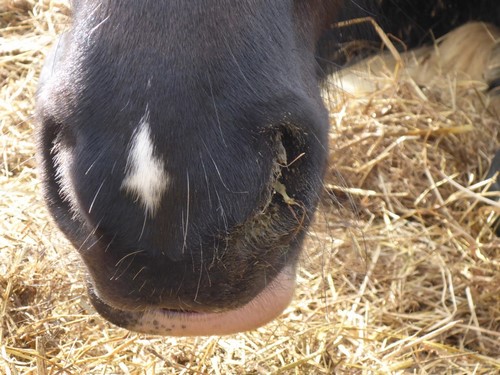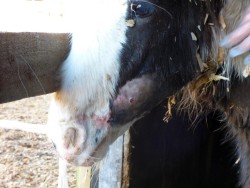A vet at Oakham Veterinary Hospital has highlighted the advantageous use of a novel antimicrobial veterinary special for the treatment of strangles carriers. The report is the first new Bright Veterinary Idea (BVI) case report to be published by Veterinary Evidence, the new open access journal run by RCVS Knowledge.
The report, submitted by Mark Bowen at Oakham Veterinary Hospital, demonstrated the use of a unique formulation of penicillin in a gel formulation that can be instilled quickly and easily into the guttural pouch of horses that are strangles carriers.
Strangles is a common condition with high morbidity. Management of outbreaks is complicated by the development of asymptomatic carriers, with the causative organism (Streptococcus equi var equi) being retained within the guttural pouch.1,2 Treatment of carriers relies on removing physical infection and administering antimicrobials directly into the guttural pouch using a slow-setting penicillin and gelatin solution. This has proved to be an awkward and lengthy process, usually only successful in a hospital environment.3
 |
Reverse thermodynamic agents, that are liquid when cool and solidify as they warm, have been used to treat otitis externa in dogs and provided the inspiration for the novel treatment for strangles carriers. Veterinary specials manufacturer (BOVA UK) formulated benzyl Penicillin in poloxamer gel and it was quickly and efficiently administered to a confirmed strangles carrier via a specially adapted uterine catheter.
The gel partially set within the pouch in just over four minutes. The treatment was repeated over three consecutive days and a cure was determined by three guttural pouch lavages taken at weekly intervals, starting one week after the last treatment.
Mark Bowen said: “This exiting report confirms the value of locally infused antibiotics in the management of strangles carriers. The reverse thermodynamic poloxamer gel proved to be a practical method to retain antibiotics within the pouch without the need for complex mixing or prolonged raising of the horse’s head. The case also highlights the value of specially formulated medicines in the management of complex diseases by providing novel delivery vehicles.”
Pharmaceutical specials are tailored medications, produced in specific dosages and formulations to meet the particular needs of individual patients. They broaden the treatment options available to vets and their patients and can enhance compliance.
-
Images attached: Horses displaying clinical signs of strangles ©Redwings Horse Sanctuary: https://www.redwings.org.uk/news-and-views/speak-out-strangles
References
George, J. L., et al. “Identification of carriers of Streptococcus equi in a naturally infected herd.” Journal of the American Veterinary Medical Association 183.1 (1983): 80-84.
Newton, J. R., Verheyen, K., Talbot, N. C., Timoney, J. F., Wood, J. L. N., Lakhani, K. H. and Chanter, N. (2000), Control of strangles outbreaks by isolation of guttural pouch carriers identified using PCR and culture of Streptococcus equi. Equine Veterinary Journal, 32: 515–526. doi:10.2746/042516400777584721
Verheyen, K., Newton, J. R., Talbot, N. C., Brauwere, M. N. D. and Chanter, N. (2000), Elimination of guttural pouch infection and inflammation in asymptomatic carriers of Streptococcus equi. Equine Veterinary Journal, 32: 527–532. doi:10.2746/042516400777584703












